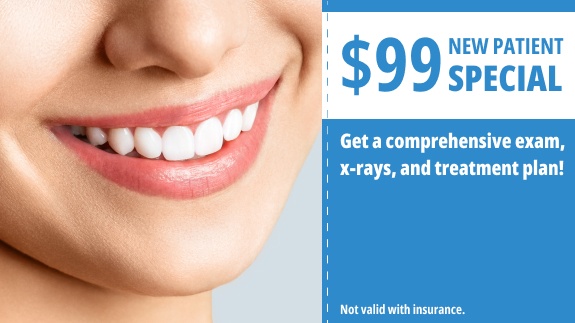- A faster, more comfortable imaging process
- Easy examination of areas not visible to the eye
- More accurate diagnosis of dental problems
- Easier and more effective treatment planning and procedures
Digital X-rays use digital sensors to capture images of your teeth. This not only makes the imaging process faster, but also exposes you to less radiation and does not require the use of any toxic chemicals to develop the captured image. In fact, digital X-rays produce 80-90% less radiation than traditional film radiography.
Our dentist may use a digital X-ray to identify the following oral health problems:
- Tooth decay
- Cysts and abscesses
- Developmental abnormalities
- Incorrect root positions
- Fractures or cracks in the tooth
- Tumors
- Infection
- Bone loss
The images captured will also aid in planning and carrying out your treatments, especially if you are receiving an oral surgery procedure, a root canal, or a dental implant.
If you have any questions about digital X-rays, we welcome you to contact our office. We will be happy to provide you with more information about how this technology is used in our practice, and help you schedule an appointment with our experienced dentist.
FAQ
Why can’t I just receive treatment without an exam/x-rays?
X-rays serve as a vital tool in the correct diagnosis of a dental issue. The oral cavity is small and only a small portion of the tooth (the crown) is visible. In order to get an insight into the depth of the cavity, the condition of the nerve supply inside the tooth, the tooth roots, and any surrounding gum infections, an X-ray is ideal.
How long does an exam appointment take?
A dental exam appointment can take anywhere between 60-90 minutes, depending upon the severity of the dental issues and the patient’s queries. It might take longer if the patient has dental anxiety.
What x-rays do you take during an exam?
A dental exam may need multiple single-shot X-rays that cover a few teeth or a full mouth X-ray with the panoramic view of the entire jaws, with all the erupted and impacted teeth, the jaw joint (TMJ), and the essential nerve canal positions. Both serve as ideal tools for treatment planning and patient education.
I got my X-rays taken recently at another office. Can I send them over?
Yes, you can if they are less than 6 months old! Sometimes the transferred images may lose clarity. Hence the dentist may request a repeat of the X-rays.
Am I getting an exam with my cleaning today?
Yes, this goes without saying. Scheduled teeth cleaning appointments are also accompanied by a thorough dental exam.
What to expect during a dental exam?
During the dental examination, your dentist or dental hygienist will:
- Assess your overall health and the condition of your oral hygiene
- Evaluate the likelihood of cavities, infections, and gum ailments
- Examine whether you require a filling, crowns, implants, etc
- Inspect the alignment of your bite and the condition of your jaws
- Illustrate correct methods for brushing your teeth or cleaning the dentures
- Will suggest fluoride therapy if needed
- Capture dental X-rays or, if deemed essential, perform alternative diagnostic procedures















